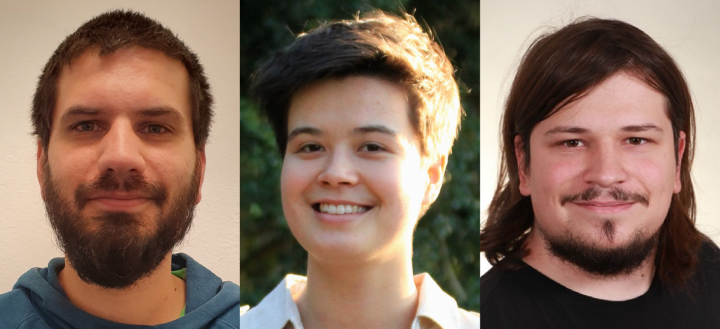An interdisciplinary team of the Institute for Computer Architecture and Computer Engineering and the Institute for Functional Matter and Quantum Technologies of the University of Stuttgart won the first-of-its-kind IBM Quantum Open Science Prize. The group solved one of the two posed quantum challenges – in this case a particular problem using current quantum computers. The four winning teams will share the USD 50,000 award. This success was made possible through the combined efforts of computer scientists and quantum physicists.
Stuttgart’s winning team consists of PhD student Sebastian Brandhofer at the Institute of Computer Engineering and Computer Architecture led by Prof. Ilia Polian, as well as postdoc Dr. Daniel Bhatti and Master’s student Jelena Mackeprang in the research group of Prof. Stefanie Barz at the Institute of Functional Matter and Quantum Technologies of the University of Stuttgart. The successfully tackled challenge consisted of reducing errors and thereby improving a certain quantum-computing task, thus contributing to making near-term quantum algorithms more reliable.
“It is great to see how the team combined expertise from different fields to tackle the quantum challenge”, says Barz. “The two institutes have been collaborating for several years, starting with a project funded by the Centre for Integrated Quantum Science and Technology”, Polian continues. The two research groups now continue the cooperation through a joint project in which they investigate IBM’s System One, the most powerful commercial quantum computer in Europe that has recently been installed in the Stuttgart area.
The key to success is interdisciplinarity
Quantum computers promise decisive improvements in domains such as sustainable production, drug design or material science, as they may solve difficult problems from those domains fundamentally faster than their classical counterparts. The main obstacle to a widespread use of this technology is the extreme fragility of quantum states that lie at its heart, leading to error rates that are often too high for computations of relevant complexity.
“We are really excited about our contribution to the state of technology and the recognition that manifested itself through the prize. It was great to apply methods from hardware engineering to improve the accuracy of the quantum computing task”, Brandhofer says. “The key to the success was combining knowledge from computer science with quantum physics”, as Bhatti points out. “I was put in a position in which I could combine my own expertise in preparing complex quantum states with techniques from computer science that were crucial in tackling the challenge”. Mackeprang adds, “it was fascinating to see how theoretical concepts connect with each other and result in more and more improvements on an actual quantum computer”.
The team’s success shows that quantum technologies, in particular, quantum computing, are an interdisciplinary effort – that can best be tackled in diverse teams.
Stuttgart’s team is one of the four winning teams, with three other finalists coming from the Massachusetts Institute of Technology (MIT) and Harvard University, the University of Chicago, as well as the Laboratoire d’Informatique, de Robotique et de Microélectronique de Montpellier (LIRMM), the University of Montpellier, the Centre Européen de Recherche et de Formation Avancée en Calcul Scientifique (CERFACS), and the Centre National de la Recherche Scientifique (CNRS) in Paris.
Expert Contact:
Prof. Stefanie Barz, University of Stuttgart, Institute for Functional Matter and Quantum Technologies, Tel. +49 711 685-61556, Email
Prof. Ilia Polian, University of Stuttgart, Institute for Computer Architecture and Computer Engineering (ITI), Tel. +49 711 685-60764, Email


